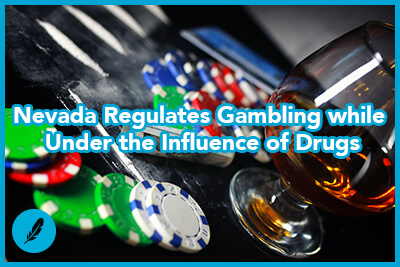NV Gaming Board Regulates Gambling while Under the Influence of Drugs
- Access to licensed treatment centers
- Information on treatment plans
- Financial assistance options

When it comes to casino regulations regarding the use of substances among customers, the Nevada Gaming Commission’s policy is a living document that is constantly under review. Most recently, their focus for change was the standard for disciplinary action for casino customers who are under the influence of drugs. Previously, the rule had been only that those who were visibly intoxicated on alcohol would be barred from play. Now Nevada Gaming Commission policy has been amended to similarly ensure that patrons who are under the influence of other substances are not served complimentary alcoholic beverages nor allowed to gamble. The amendment was passed unanimously by the five members of the commission and is likely in response to Nevada’s legalization of marijuana for recreational use. However, the amendment applies to those who are under the influence of both legal and illegal substances.
Tony Alamo is chairman of the commission. He said: “We always want to protect a patron, and we always thought about intoxication being from alcohol. Now people can become incapacitated from drugs and alcohol. So, you see we have to change even subtle things like that because of changes in society.”
Keeping up with Societal Changes
It is not just the Nevada Gaming Commission that has opted to address and update its policies in order to keep up with the changes in society regarding drug and alcohol use. Due to changing laws and regulations, many are changing their views of substances that are either newly legalized, like marijuana, or substances that are not yet illegal, like certain synthetic drugs. In both cases, the prevailing view is that legal (or not illegal) status equates with safe use in any and all context, and in both cases, that view leads to unsafe use that can be deadly in some cases.
When it comes to marijuana, a substance that is heavily impacting Nevada right now in the wake of recreational legalization of the drug, many people are using it as if it were harmless. For example, too often, users of legal marijuana believe that it is safe to:
- Use marijuana in large amounts
- Combine its use with alcohol and other substances.
- Get behind the wheel after getting high
- Care for children or other dependent family members while under the influence
- Go to work while under the influence
- Use the drug at work or in public areas
- Self-medicate physical or mental health disorders with use of the drug
None of these are safe. In fact, all can have devastating consequences either for the user or for the people they are caring for, working with, or coming into contact with on the road. Marijuana, no matter what its status, is a potent drug that is mind-altering, and for those who are living with an addiction, it can be particularly dangerous.
Does your insurance cover treatment at Desert Hope in Las Vegas?
Check your insurance coverage or text us your questions to learn more about treatment by American Addiction Centers (AAC).
Is Marijuana a Substitute for ‘Harder’ Drugs in Recovery?
Perhaps due in part to the perception that marijuana is a harmless substance, many people in recovery ask if it is safe for them to smoke weed during recovery. The idea is that as long as they are not using their drug of choice or any so-called “hard” drugs, that they are still in recovery.
The fact is that true recovery doesn’t work this way. Abstinence is essential, but it is also just a first step. It is important to follow up with learning how to handle things like stress, irritation, boredom, and mental health issues without self-medication with substances. Many experts say that while the use of drugs is problematic, it is not the root problem. Untreated trauma, poor coping skills, low self-esteem, and other issues often drive compulsive use of addictive substances and the cravings that arise despite a genuine desire to stay clean and sober.
Though it may seem like a good half-step between active addiction and active recovery, it is actually just continued addiction even if the drug of choice has changed. Through treatment, community support, and persistence, the hard work of getting and staying sober can become a new way of life that is defined by balance and sobriety.
What have the changing marijuana laws meant to you in your recovery? How are you staying sober with the changing societal standards of what constitutes legal and illegal substances?